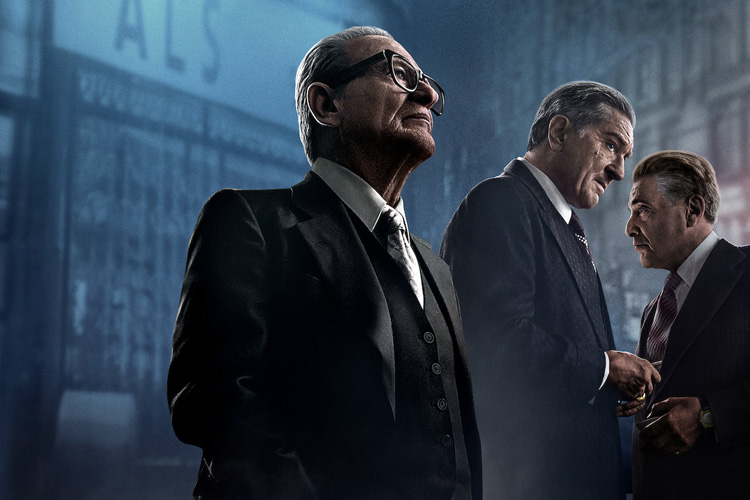Martin Scorsese has something important on his mind. No, not Marvel movies; he’s made it clear that those are dangerously unimportant. It’s legacy. Scorsese’s career has long been inextricable from the legacy of cinema: he helped spearhead the New Hollywood of the 70s, a bygone era when the biggest movies were steered by artistic vision; he founded The Film Foundation and the World Cinema Foundation, the leading non-profits in film preservation; and he democratizes the craft by financing movies from women and people of color. And now, in his older years, he’s more cognizant than ever of the legacy he’s leaving behind—and of the dwindling time he has left to do so. According to Scorsese himself, making The Irishman was “learning to die”.
Indeed, The Irishman is a film that’s intimately concerned with the endgame. No, not that endgame; the ultimate endgame—the end from which there’s no return, a concept that proves difficult to grasp for the movies that draw Scorsese’s ire. The Irishman chronicles the life of Frank Sheeran, a mafia hitman who spent his final days confessing to high-profile crimes. Those confessions were documented in the 2004 memoir I Heard You Paint Houses, but many of Sheeran’s claims were later discredited, rendering the memoir a potential work of fiction. That’s no matter to Scorsese, though, who reworks the story into a parable about passing away.
The Irishman opens on those final days of Sheeran’s life, taking us through his nursing home in a winding Steadicam shot reminiscent of Goodfellas’ Copacabana entrance. This allusion immediately clothes The Irishman in the garb of Goodfellas and Casino: Scorsese is again tracking the rise and fall of historical American gangsters. But where his past films ended with the twilight of gangsters’ careers, The Irishman marches on to a more distant twilight—imagine if Goodfellas went on for an additional hour, watching Henry Hill adjust to life as a “schnook”, as he so memorably lamented in the film’s final line. The intrusion of law into a criminal enterprise is not the end of a gangster’s story. The Irishman coaxes us into that mindset by unleashing the specter of death posthaste—even characters’ introductory title cards include details of their demise.
The first couple hours of The Irishman follow Sheeran as he intermingles with these doomed personalities. After working for mobster Russell Bufalino as a house painter (read: blood splatterer), he’s enlisted by labor union leader Jimmy Hoffa—a name that’ll ring as famous, infamous, or unfamiliar, depending on your background and age. The bulk of the movie consists of Sheeran’s exploits with Hoffa and Bufalino, variably working with or against each other as the tides of the underworld turn. With sharp dialogue from Schindler’s List scribe Steven Zaillian and reliable chemistry between De Niro, Pacino, and Pesci—actors with their own self-reflexive legacies—the first hours of The Irishman are replete with indelible mafia tales.
In keeping with Scorsese’s late-period work, these tales are circuitous and laid-back, which is accentuated by a score that’s practically easy listening. Veteran editor Thelma Schoonmaker keeps things moving along at a clip, despite the length and relaxed pace. But even if The Irishman never bores, it’s hard to escape the feeling that it doesn’t build. As the first hours of the movie meander through decades of events, a cohesive sense of causality is lost, and scenes commence without shrewd regard for what came before. It’s almost as if we’re watching Sheeran’s dying fever dream of his past—absorbing, but disorienting.
But then The Irishman enters its final hour, and it all comes together with a crushing blow. We’re reminded that we are, in fact, hearing Sheeran’s stories from his end-of-life perspective. The life of a gangster continues past prison sentences, past the witness protection program, past egg noodles and ketchup. At some point, the trail goes cold, and your past isn’t going to keep you warm. The Irishman’s denouement reaches a level of poignancy rivaled in Scorsese’s oeuvre only by Silence: every mafia brute is an eventual old man, and in that ultimate culmination, they shall know what their legacy hath wrought. It’s a conclusion that bookends a major part of Scorsese’s legacy, something like The Godfather Part III done right. It also finds Robert De Niro, Scorsese’s longtime muse, at the height of his acting ability—De Niro musters a performance that might be a career-best.
Though The Irishman’s ending does a marvelous job of validating what precedes it, the memory still remains of those middle hours, when the looseness of Sheeran’s recollections had not yet been subverted. But it’s a small mark on the experience—just as small as the occasional foibles of the de-aging effects—and it doesn’t lessen the staying power of The Irishman, a definitive film with its eyes on the finish line.
★★★★½ (4.5/5)




